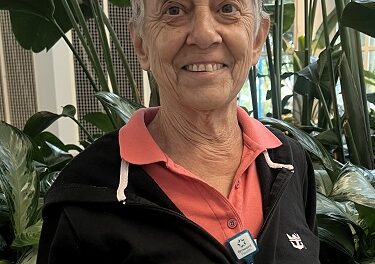.jpg) Growing up in Miami, Michael Zinner, M.D. wanted to be a biomedical engineer, influenced somewhat by the hit 1970’s TV show, “The Six Million Dollar Man,” starring Lee Majors. That path led him to medical school where he remained interested in a biomedical career. Ultimately, he pursued internal medicine and became a general surgeon specializing in pancreatic-hepatobiliary diseases.
Growing up in Miami, Michael Zinner, M.D. wanted to be a biomedical engineer, influenced somewhat by the hit 1970’s TV show, “The Six Million Dollar Man,” starring Lee Majors. That path led him to medical school where he remained interested in a biomedical career. Ultimately, he pursued internal medicine and became a general surgeon specializing in pancreatic-hepatobiliary diseases.
While Dr. Zinner did not end up implanting people with bionic parts to enhance their strength, speed and vision, he used his abilities to remove, repair, and replace parts of his patients’ bodies affected by disease. At age 70, Dr. Zinner now moves into the next phase of his career.
After spending 28 years with the Dana-Farber/Brigham and Women’s Cancer Center in Boston, where he was Clinical Director and Surgeon-in-Chief at the Brigham and Women’s Hospital, the world-renowned and highly respected cancer surgeon and researcher was appointed as founding CEO and executive medical director of Miami Cancer Institute at Baptist Health South Florida.
Dr. Zinner is excited about the opportunity to come back home and the new opportunities he faces.
“Miami Cancer Institute was a fantastic new opportunity to jump in and take on a new challenge and new responsibilities,” he says. “It made it even sweeter that I could come back to my hometown. I have many friends and family who still live in South Florida.”
An expert in pancreatic-hepatobiliary diseases, Dr. Zinner was also the Moseley Professor of Surgery at Harvard Medical School and founder of Harvard’s Center for Surgery and Public Health. From 2008 to 2010, Dr. Zinner was the Chairman of the Board of Governors of the American College of Surgeons (ACS) and is now a Vice Chair of the Board of Regents of the College. Additionally, he is Chairman of the Health Policy and Advocacy Committee for the American College of Surgeons.
In just the first few weeks learning more about Miami Cancer Institute and meeting with staff, Dr. Zinner has been impressed with the strong leadership team the institute has built.
“Everyone I have met, including the incredible physician staff, has been very impressive and very dedicated,” he says. “I feel very comfortable in this environment. Everything has been done with the highest quality. If I could have designed something from the ground up, it would have looked like Miami Cancer Institute.”
Dr. Zinner has a simple vision for the institute—to make it a destination cancer center that delivers the highest-quality personalized care for cancer patients and their families by using the newest technologies. He wants people in the community to recognize Miami Cancer Institute as their go-to facility for not only cancer care treatment, but early-stage diagnosis, early-stage prevention, treatment and post-care.
“Cancer care is a very personalized, highly intensive-type of care that involves family support, so it’s disruptive if people feel the need to leave the community,” explains Dr. Zinner. “I would not want anyone from South Florida seeking cancer treatment to travel outside for their care. When I was with Dana-Farber/Brigham in Boston, I treated many people who traveled from South Florida. I also know many people will go to other places all over the country for cancer care. I want Miami Cancer Institute to be their destination cancer center and I feel confident that we can deliver that care.”
Miami Cancer Institute will house cancer services under one roof. The new facility, slated to open in 2016, will offer 305,000-square-feet of clinical services and cutting-edge technology. A 90,000-square-foot research facility will provide access to clinical trials and groundbreaking treatments. Designed with patient comfort and convenience in mind, the institute will offer diagnosis, treatment, research trials and follow-up care. It will also be one of the few cancer centers in the nation to offer proton therapy, an innovative treatment targeting cancer cells with pinpoint precision, avoiding healthy tissue.
Cancer research has reached a pivotal moment. Innovative studies are leading to promising outcomes – giving hope to patients for better ways to treat, manage and even cure the disease. Miami Cancer Institute will be supported by a clinical and research alliance with one of the leading academic centers in the world. It will accommodate principal investigators, researchers and staff who conduct clinical trials that utilize translational research and the most advanced genomic medicine. Patients will have access to clinical trials that may lead to monumental treatment breakthroughs right here at home.
“Through clinical research and trials, we hope to break new ground in terms of cancer care,” says Dr. Zinner. “Clinical trials help us compare a standard therapy versus a newer therapy. These kinds of trials will be available for those patients here at Miami Cancer Institute so patients don’t have to travel out of the state or out of the region. This robust clinical trial program will also give us the ability to take tumor or blood samples from patients and test them for genomics to help design trials appropriate for that kind of tumor.”
One final component that Dr. Zinner plans to focus on as he gets ready to lead Miami Cancer Institute is a survivorship program, where a multidisciplinary team will work together to improve long-term cancer survivorship care and the treatment of side effects for patients and providers.
“Some patients who used to have cancer may still have the side effects of the treatment,” says Dr. Zinner. “They may have developed other complications such as heart disease, lung disease or kidney disease. One of the great advantages of Baptist Health is that the system has a superb institute like Miami Cardiac & Vascular Institute. For former cancer patients who now have the side effects of treatment and need further treatment for something like heart disease, Baptist Health has one of the best programs in the region. That part of cancer care should never be neglected and will always be part of our program.”


























